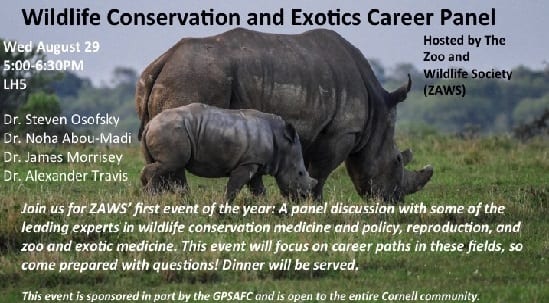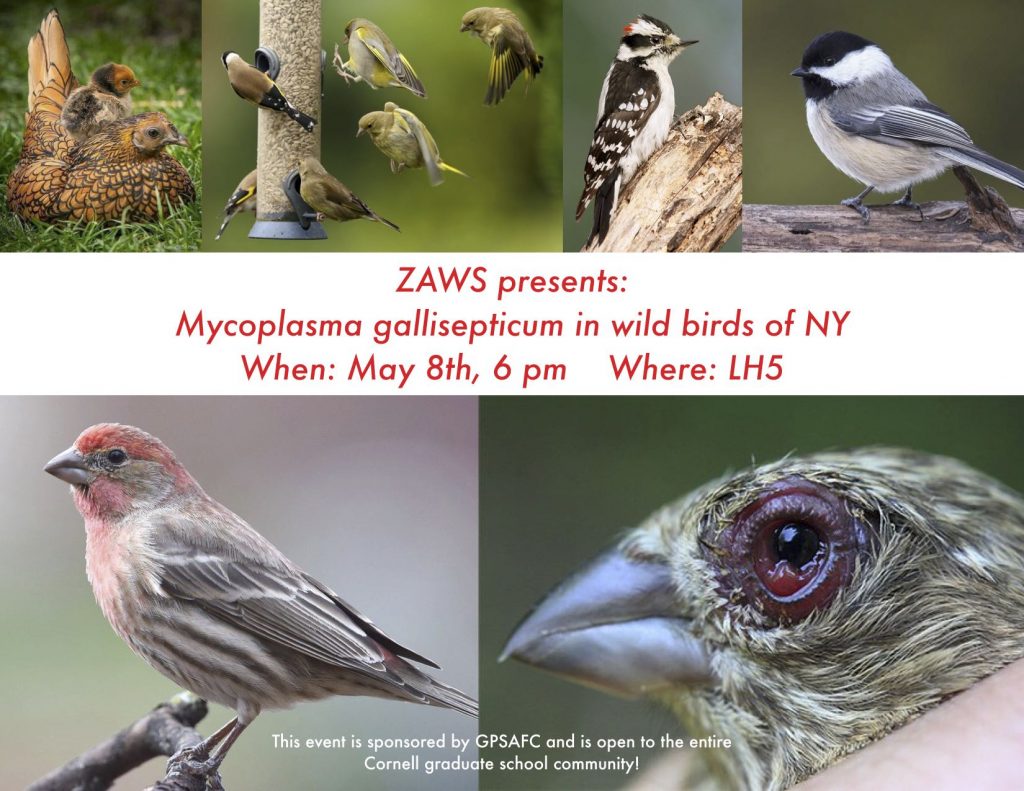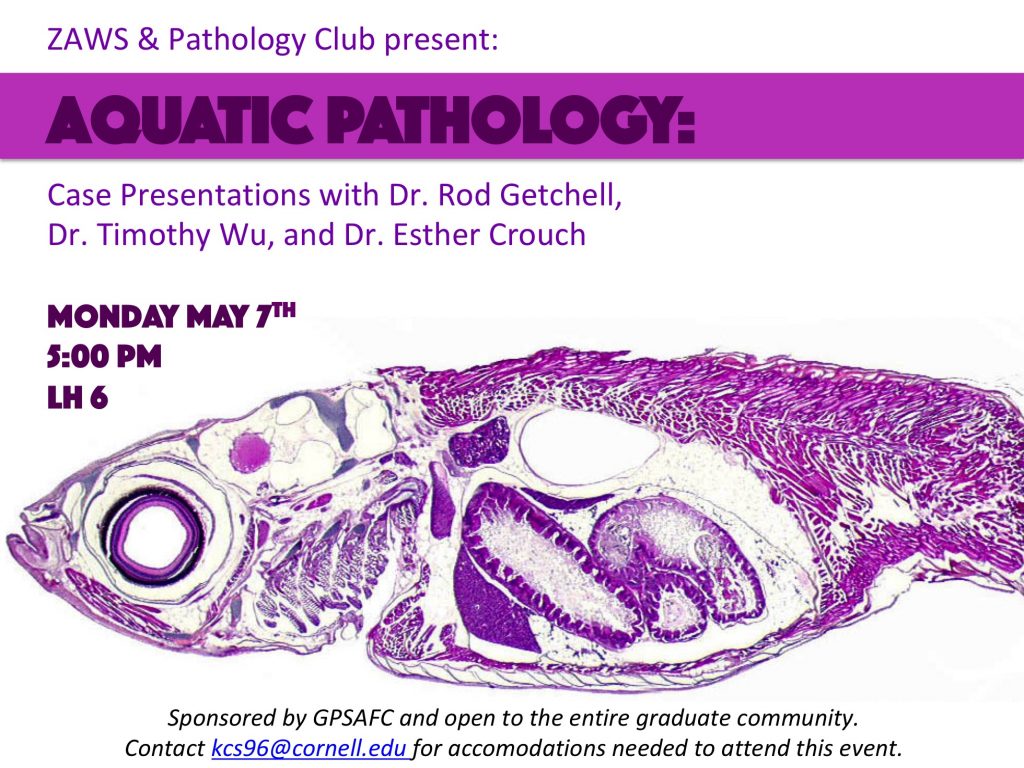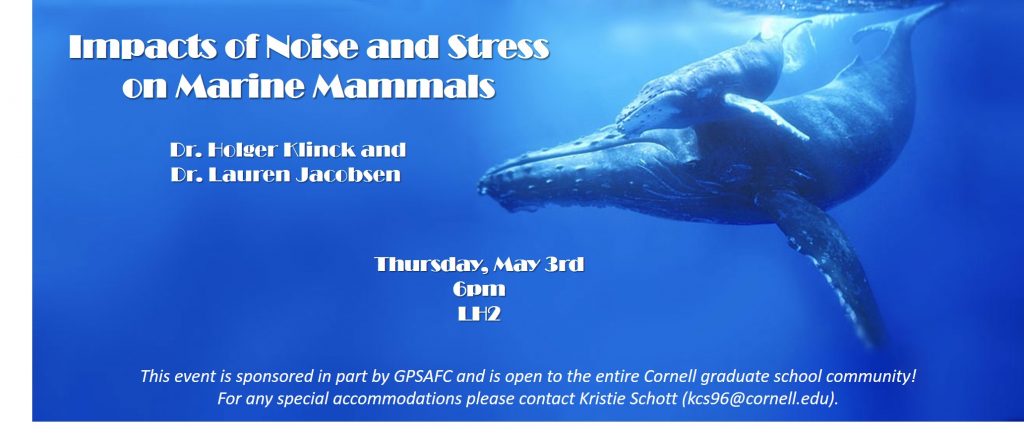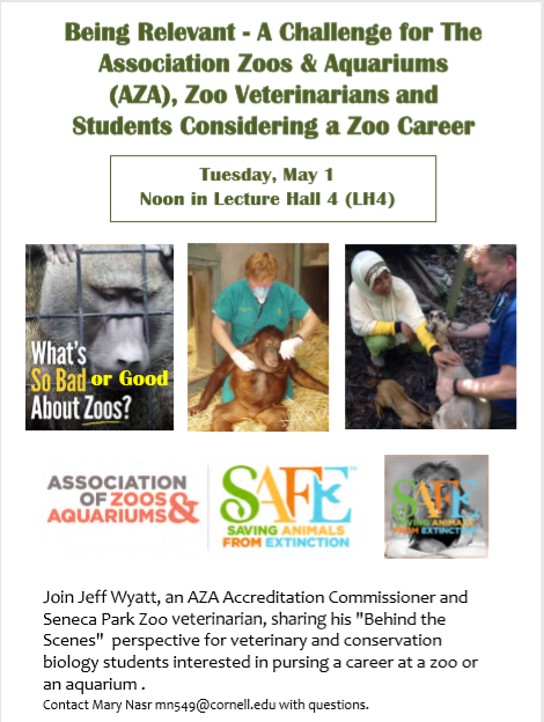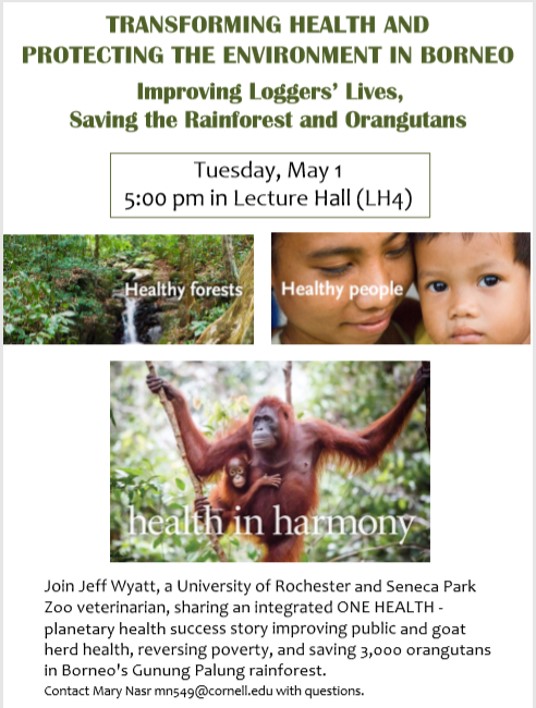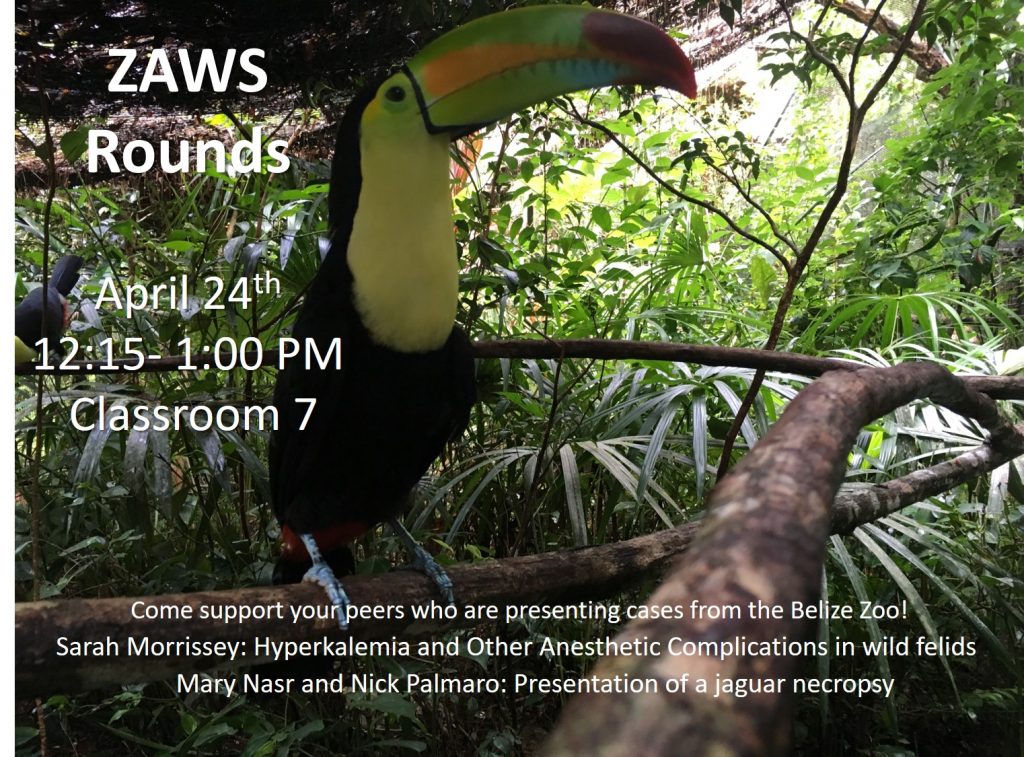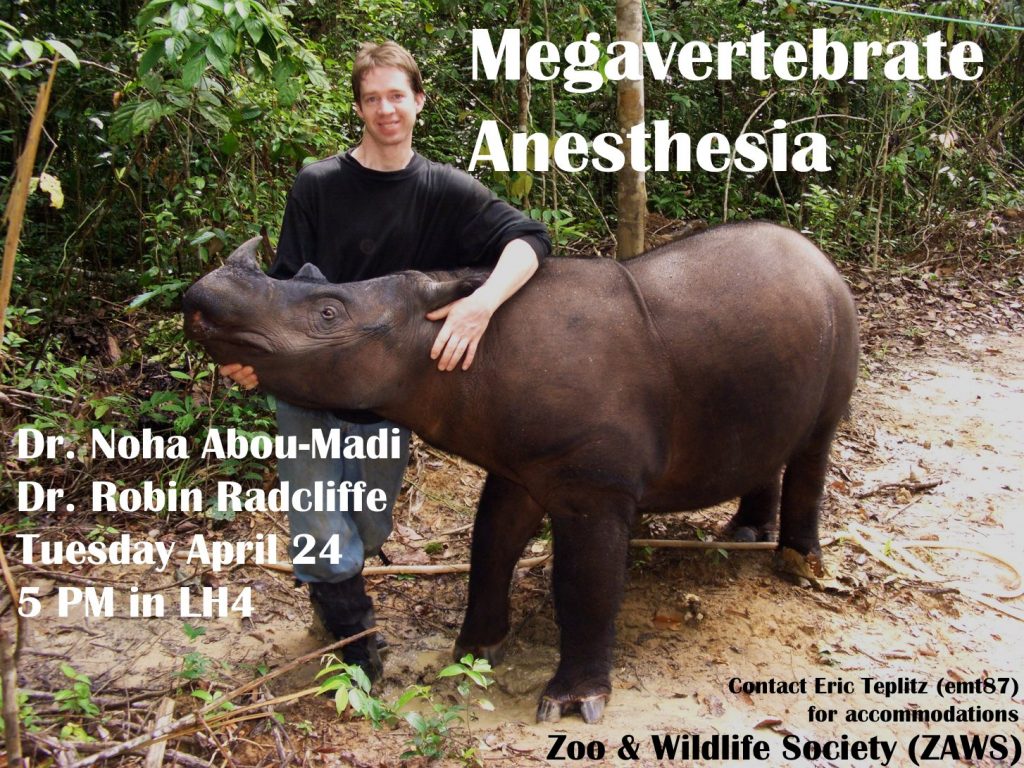 There was once a time in my life when I could only dream about performing a physical exam on a sedated jaguar in the Belizean jungle, but that dream, along with many others, became a reality as a student enrolled in Dr. Noha Abou-Madi’s International Experience in Wildlife Health and Conservation course. Cornell University College of Veterinary Medicine (CUCVM) has been partnered with the Belize Zoo since 2011 to provide state-of-the-art veterinary care while simultaneously fulfilling the dreams of adventurous veterinary students looking to hone their clinical skills. After having to cancel this trip multiple times throughout the COVID-19 pandemic, Dr. Noha Abou-Madi could not be more excited to offer this course once again to those with career goals involving wildlife and zoological medicine. In this course, students travel to the Belize Zoo where they stay for a week to gain hands-on experience with various mammals, birds, and reptiles native to Belize.
There was once a time in my life when I could only dream about performing a physical exam on a sedated jaguar in the Belizean jungle, but that dream, along with many others, became a reality as a student enrolled in Dr. Noha Abou-Madi’s International Experience in Wildlife Health and Conservation course. Cornell University College of Veterinary Medicine (CUCVM) has been partnered with the Belize Zoo since 2011 to provide state-of-the-art veterinary care while simultaneously fulfilling the dreams of adventurous veterinary students looking to hone their clinical skills. After having to cancel this trip multiple times throughout the COVID-19 pandemic, Dr. Noha Abou-Madi could not be more excited to offer this course once again to those with career goals involving wildlife and zoological medicine. In this course, students travel to the Belize Zoo where they stay for a week to gain hands-on experience with various mammals, birds, and reptiles native to Belize.

International Experience in Wildlife Health and Conservation provides students with opportunities that go beyond the core curriculum, offering depth and breadth of knowledge in zoological and conservation medicine. Previous student Sophie Yasuda ‘25 stated, “one of my favorite parts of the trip was being able to participate in every aspect of the animals’ veterinary care and learn about each component from knowledgeable veterinarians. Being able to conduct physical exams, monitor anesthesia, observe dental procedures, collect samples, and run lab work on species as majestic and diverse as jaguars and harpy eagles was an incredible experience. In addition, it was a valuable learning experience to work in an unfamiliar hospital and extremely rewarding to feel our group turn into a cohesive and close-knit team.”
After working with an otter, kinkajou, and fer-de-lance, Erin Guntrum ‘25 recalls that her most memorable experience of the trip was auscultating the heart of one of the jaguars. She thought that the heart sounds were abnormal, but she was unable to figure out exactly what was abnormal about them – a murmur, an extra heart sound, an abnormal rhythm, etc. She worked closely with Veterinary Resident of Zoological Medicine Dr. Melissa Hanson to discover a split S2 sound – something that Dr. Hanson explained can be a normal finding in a larger animal where the aortic and pulmonic valves do not always close with perfect synchronicity. This was a memorable experience for Erin because despite not being able to identify the exact heart sound, she was able to recognize a difference between the heart sounds she heard in the jaguar and the ones she has been taught in CUCVM’s core curriculum. As a student developing her clinical skills, this felt like a win to Erin, and I agree!
 The relationship between the Belize Zoo and CUCVM is one that not only fosters students’ education and clinical skills as they pertain to zoological medicine, but also as they pertain to conservation. The Belize Zoo is highly committed to the animals within their direct care, but they also care for those that live beyond their gates. Erin Guntrum ‘25 recalls a lecture that we received highlighting the integral role that zoos play in the realm of conservation in which we learned that the Belize zoo has been purchasing land to be utilized as wildlife corridors to once again connect wild populations that have been separated by human establishments. Members of the Belize zoo are very aware that the human population is expanding and so too is development, nonetheless they are trying their best to ensure that land exists for wildlife in the future.
The relationship between the Belize Zoo and CUCVM is one that not only fosters students’ education and clinical skills as they pertain to zoological medicine, but also as they pertain to conservation. The Belize Zoo is highly committed to the animals within their direct care, but they also care for those that live beyond their gates. Erin Guntrum ‘25 recalls a lecture that we received highlighting the integral role that zoos play in the realm of conservation in which we learned that the Belize zoo has been purchasing land to be utilized as wildlife corridors to once again connect wild populations that have been separated by human establishments. Members of the Belize zoo are very aware that the human population is expanding and so too is development, nonetheless they are trying their best to ensure that land exists for wildlife in the future.

The Belize Zoo’s conservation efforts were very motivating for some, including Sophie Yasuda ‘25 who stated, “my decision to apply to the course stemmed from my desire to contribute to the preservation of wild populations through a career as a wildlife veterinarian. During my time at the Belize Zoo, I was inspired not only by the quality of veterinary care provided by Cornell’s doctors, but also by the amazing care provided by the keepers at the zoo and the impact the zoo has on improving public perception of native wildlife. Overall, the experience strengthened my desire to use my veterinary degree to contribute to wildlife conservation.” Emma Fralin ‘25 was also very encouraged by the zoo’s conservation efforts and is certain that visitors receive the same inspiration. She states, “the care that the animal keeper’s exemplified for their animals was practically palpable. I am confident that this care and respect translates to every visitor of the Belize Zoo.”
International Experience in Wildlife Health and Conservation is a course unlike any other, offering an experience of a lifetime. From monitoring the anesthesia of a spider monkey to drawing blood from a white-tailed deer in the field, you really get to do it all. This trip is a must for those seeking a well-rounded veterinary education in zoological, wildlife, or conservation medicine. I think Erin Guntrum ‘25 truly encapsulates how we all felt after our experience at the Belize Zoo when she said, “I’ve always dreamed of being a zoo or wildlife veterinarian. And this trip was so special because it was really the first time that I got to live out that dream – and it really affirmed that this is what I want to do, and that this is something I can do.”
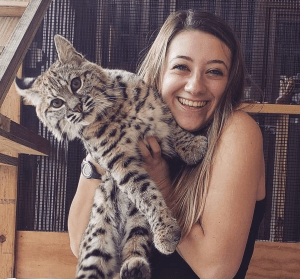
Maison Scheuer is the 2022-2023 WildLIFE Blog Editor and a proud member of Cornell ZAWS. Her passions lie at the intersection of veterinary medicine and wildlife conservation. She loves to travel and has spent time in Canada, Thailand, Alabama, Belize, and Honduras where she studied Columbian ground squirrels, elephant conservation, wildlife rehabilitation, and veterinary medicine. Though particularly interested in One Health and international medicine, she has also discovered a love for small animal medicine through her experience working as a veterinary technician at a full-service exotics and small animal private practice.

 Dr. Matt Marinkovich always had a passion for wildlife but was initially unsure as to what career path might suit him best. “I always knew I wanted to do something with wildlife or something conservation related, but it took a little while to find what that niche was, whether PhD or vet school. I had a couple experiences at SeaWorld San Diego when I was in undergrad and at the National History Museum in Santa Barbara working with the Marine Mammal Stranding Network that led me to really feel like veterinary medicine was the route to go.” After taking 3 gap years, he began his time at Cornell Vet, going on to complete his DVM in 2014.
Dr. Matt Marinkovich always had a passion for wildlife but was initially unsure as to what career path might suit him best. “I always knew I wanted to do something with wildlife or something conservation related, but it took a little while to find what that niche was, whether PhD or vet school. I had a couple experiences at SeaWorld San Diego when I was in undergrad and at the National History Museum in Santa Barbara working with the Marine Mammal Stranding Network that led me to really feel like veterinary medicine was the route to go.” After taking 3 gap years, he began his time at Cornell Vet, going on to complete his DVM in 2014. While well aware that the field of zoological medicine is competitive, Dr. Marinkovich has a refreshing viewpoint. “I think really just focusing on becoming the best vet you can be is the number one step. I think what we look for in terms of a good resident is someone who has a really good foundation in veterinary medicine, and that involves all species. The next time you have to help pull a calf, it may be an exotic bovid rather than a dairy cow.” His perspective, he says, is largely informed by his respect for mental health. “I’m a huge proponent of mental health and being happy with what you’re doing and enjoying each step of the journey. I think you need to take each step and try to get the most out of each experience for what it is. It’s great if zoo residency or working a zoo job works out, but if not, being a vet is an awesome job and you still have that to be fulfilled by. You have to try to not let the quest for that elusive zoo resident position to be the end all and be all of what it means to be fulfilled in this field. Developing your skill sets, really focusing on your own mental health, and who you are as a vet and as a person is going to set you up for success.”
While well aware that the field of zoological medicine is competitive, Dr. Marinkovich has a refreshing viewpoint. “I think really just focusing on becoming the best vet you can be is the number one step. I think what we look for in terms of a good resident is someone who has a really good foundation in veterinary medicine, and that involves all species. The next time you have to help pull a calf, it may be an exotic bovid rather than a dairy cow.” His perspective, he says, is largely informed by his respect for mental health. “I’m a huge proponent of mental health and being happy with what you’re doing and enjoying each step of the journey. I think you need to take each step and try to get the most out of each experience for what it is. It’s great if zoo residency or working a zoo job works out, but if not, being a vet is an awesome job and you still have that to be fulfilled by. You have to try to not let the quest for that elusive zoo resident position to be the end all and be all of what it means to be fulfilled in this field. Developing your skill sets, really focusing on your own mental health, and who you are as a vet and as a person is going to set you up for success.”  Colleen Sorge, Class of 2024, is originally from Long Island, NY. She graduated with a B.S. in Animal Science and a minor in English from Cornell University. She often finds herself missing her humanities courses in vet school and is thrilled she can combine her passions for writing and for veterinary medicine as the WildLIFE Blog Editor.
Colleen Sorge, Class of 2024, is originally from Long Island, NY. She graduated with a B.S. in Animal Science and a minor in English from Cornell University. She often finds herself missing her humanities courses in vet school and is thrilled she can combine her passions for writing and for veterinary medicine as the WildLIFE Blog Editor.